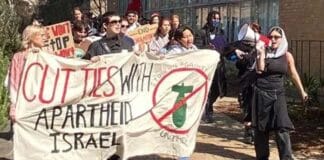HOMELESS MELBOURNE students and their student union supporters took action last month to address a housing shortage and associated rent rises. They are occupying a disused university-owned building at 278 Faraday Street, in inner-city Carlton, which has been vacant for three years.
The University of Melbourne Vice-chancellor, Glyn Davis, acknowledges the housing crisis after a survey released in August reported 440 cases of homelessness and many others of severe housing stress.
But while the federal government is engaged in a review of student welfare nothing will be done until at least 2009.
Organised in SHAC (Student Housing Action Collective), the students have lodged demands and a plan of action for investing in affordable student-run accommodation with the university.
SHAC is suggesting that the university make provisions to turn 278 Faraday St into an affordable student housing co-operative managed by students. A meeting of the University of Melbourne Council agreed to examine the proposals; however, they won’t negotiate while students are occupying.
This means they have given SHAC time to build further support. Solidarity from other campuses is growing. The post-grad union, UMPA, supports the action. The local National Tertiary Education Union branch has passed a motion of support for the occupation.
The building consists of four terrace houses linked, with sufficient room for accommodation for about 40 students, according to the student union welfare officer Allegra Reinalda.
She explained: “Within the inner city region there is a rental vacancy rate of only 0.3 per cent and the figure for the affordable rental vacancy rate is only a fraction of this. Rents are still rising.
SHAC member Liz Turner said, “The SHAC co-operative is taking direct action to address the real need for low cost student housing.
“We are acting for ourselves and for our fellow students who are in stressful housing situations.”
Activists are regularly addressing students at lectures and seminars and inviting people and organisations to visit the house.
Public forums are held every Thursday at 6pm. Regular postering and leafleting on the campus and around Carlton is attracting interest from students and residents locally.
The most immediate need is to maintain the occupation and build wide support for the action.
This requires an effort to build mass meetings of hundreds of students and staff, so that large numbers can be mobilised to stop the occupiers being evicted if it becomes necessary.
Without demonstrations of thousands of students, SHAC will not have the power to win its demands.
In order to address the housing needs of all students, SHAC collective can also adopt demands to win better resources for all students, including adequate Housing Allowances for all, including International students and post-graduates.
With billions of dollars tied up in federal government coffers, better student incomes are affordable.
Students at the occupation told Solidarity: “Students are struggling on low income support and forced to work long hours in order to pay the rent. We have little time for study. International students are worse affected.
“Melbourne University is complicit in the exploitation of international students, treating them as cash cows without providing adequately for their welfare.”
By Judy McVey
You can support the action by:
1. Signing the online petition to convert the property at 278 Faraday Street into a resident run housing co-operative www.petitiononline.com/SHAC08/petition.html
2. Arranging for a representative to speak at your union or community group meeting.
3. Donating to the campaign with money or housing needs.
Contact SHAC http://shacmelbourne.blogspot.com or [email protected]





